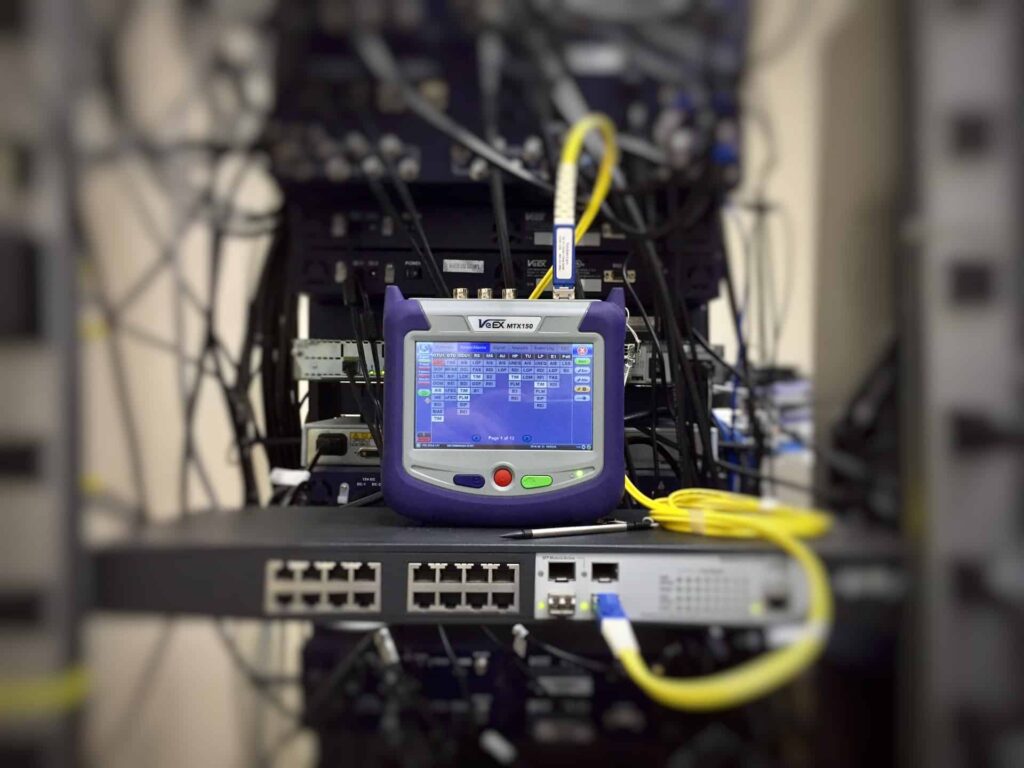The decision to move to a colocation data center must be considered in the context of operational reliability, security, and of course, cost. More companies are discovering that colocation solves many of their problems without managing their own data center.
Businesses may use colocation services because they don’t have the necessary resources to maintain their own data center. So, to take advantage of all the benefits without having a data center, they opt for using a colocation data center.
Related: Data Centers: What They Do & Why
What Is a Colocation Data Center?
A colocation data center, also referred to as “colo” for short, is an outsourced data center solution for smaller companies with limited IT capacities that need to increase the size of their data center. It is the usage of third parties facilities to place enterprise-owned computing, storage, and networking assets.
This is an ideal option for small companies because they don’t have to build their own data center. In the end, it’s more affordable than buying and installing all the resources.
Several organizations place their servers with colocation from the same physical colocation data center provider. Colocation data centers include power, cooling, physical office network connections, and the associated bandwidth as their primary services. At C&C Technology Group, we implement the market’s best practices to help our customers meet their business goals.
Suppose a business has different branches located in other parts of the country. In that case, they may use multiple colocation facilities to ensure that the offices have their respective data center locations nearby.
Good colocation facilities offer:
- Security
- Scalability
- Advanced technology
- Manageability
Colocation data centers eliminate the need to create and manage in-house server rooms, ultimately giving clients the ability to focus on their business.
Different Types of Data Centers
Two of the widely used terms to define the types of data center colocation are wholesale and retail.
Data Center Colocation: Retail
A retail colocation data center allows various data center holders to co-locate their material in the same facility and take advantage of extra services within those buildings, such as managed IT.
If your business does not require considerable amounts of space or power and does not have IT staff to maintain server space, retail colocation might be the best option for your business.
Today, many “retail” colocation providers can help giant footprints while also providing managed services, on-site personnel, and carrier and cloud connectivity. In other words, the line between retail and wholesale is much blurrier.
Data Center Colocation: Wholesale
Wholesale facilities are where businesses with large footprint requirements rent space and power, bringing everything else with them: IT staff, hardware, IP carriers, cloud connectivity—the works.
Typically involves leasing larger amounts of space and power. And by power, we are talking about vast amounts of power here. This also enables companies to determine how the area is created and manufactured. The responsibility to operate and support a wholesale data center can be the responsibility of the data center provider or the end user.
Related: Data Center Infrastructure: What You Need To Know
Colocation Data Center vs. In-House Data Center
While data center outsourcing offers numerous benefits, some enterprise companies may still choose to manage their data centers for a couple of reasons.
Control Over Information
Whenever you put someone else in charge of crucial devices, you risk damage to your devices and even unexpected information loss. Thankfully, data centers are established with redundancy and other protocols to decrease the probability of this occurring.
But some business services with the understanding and resources to manage data internally feel more comfortable with being liable for their servers.
They likewise take advantage of being able to fix server problems right away when they take place. Therefore, enterprise organizations seeking to contract out should work closely with their company to guarantee issues are solved promptly.
Legal Constraints
Enterprise business owners might discover that they are unpleasantly shocked by the limitations of the agreement between their company and a colocation data center. Provisions that consist of:
- Vendor lock-in
- Contract termination or nonrenewal
- Equipment ownership
Colocation Data Centers vs. Colocation Server Racks
When looking into colocation data center alternatives, you’ll need to understand the difference between full colocation data centers and colocation server racks. The terms are often used interchangeably, but appropriately speaking, colocation data centers mean a data center company rents out the entire facility. On the other hand, a colocation rack is when they lease rack space within a data center to numerous businesses.
Many retail colocation data centers let organizations rent entire racks or spaces within a rack. Whatever the needs of your company, colocation data centers are most likely the ideal option.
Colocation vs. Cloud Services
The cloud is another option over data center colocation:
Cloud companies will manage all elements of the data: servers, storage, and network aspects. An enterprise’s only duty will be to work with its services and utilize them.
Cloud services are fantastic for enabling a service to focus more on its service requirements and less on the technical specifications for warehousing its information. In this case, cloud services can be more affordable and allow new businesses to get off the ground quicker.
More established organizations are considered a better fit to manage their own data center requirements through colocation or in-house, and the expenses to develop and preserve their colo will be cheaper in the long run than cloud services alternatives.
Cloud services likewise enable access to fast start-up times, less technical knowledge required to get going, quickly scalable server needs, and incorporated services with all the other choices a cloud service provider might use, such as:
- Integrated tracking
- Data storage and querying tools
- Networking tools
- Machine learning tools
What Are The Most Used Services?
Data center colocation services offer support, cooling, horsepower, bandwidth, and physical protection. The clients implement both storage and servers. The room at a facility is either rented by the room, cage, rack, or cabinet. Today, many colocation data centers are expanding their portfolio to extend managed services that back their client’s company ambitions.
Benefits of Using A Colocation Data Center
Companies and individuals can enjoy many great benefits from using the services of a colocation data center. Here are some of the advantages when deciding if this type of service is a good option.
- Effortless Scalability – You can quickly have new servers or other equipment added to the facility when your business grows. It could be much more complicated to expand when you have your gear in a small local data center or server closet.
- Outstanding Reliability – Colocation data centers are built with the most crucial specs for redundancy. This includes multiple network connections through multiple telcos, excellent physical security, backup power generators, cleaning, and much more.
- Lower Payments – When comparing the costs of a colocation data center with building your facility, it is an obvious choice. Unless your equipment requires a considerable amount of room, the costs will be far lower when using a colocation option.
- Predictable Costs – The costs connected with a colocation data center will be predictable. Typically, you will sign contracts that last one or more years, so you know exactly how to budget for your IT demands.
- Anywhere Any Time – You can choose the location of your data center so that it is near your users.
- Less IT Staff – You don’t need to worry about installing equipment, managing power, running cables, or any number of other technical processes. In many cases, the colocation data center will even replace components or perform other tasks as needed. This means you don’t need to have a large IT staff employed to handle this work.
Are you looking for a high-quality provider to safeguard your delicate data? Contact the team at C&C Technology Group!
Related: Understanding Data Center Energy Consumption
Data Center Tiers (1,2,3,4)
Data center tiers are approved for ranking data centers regarding their potential infrastructure performance (uptime). Data center tiers reflect a level of robustness. The ranking goes from 1 to 4. 1 is the lowest and 4 is the highest. Higher-ranked data centers have higher potential uptime than lower-ranked data centers.
Colocation Data Centers: What’s Next?
The biggest push in the market originates from cloud companies that utilize colo as a way to fulfill their substantial device storage needs. At the same time, the industry has been and will continue to remain fluid as laws alter regarding cloud storage requirements.
While soaring demand from cloud companies has increased the requirements for data center colocation, brand-new technology offers rack storage density options that enable colo centers to alleviate the need for hardware space.
C&C Helps Plan Data Centers
Generally, colocations are an excellent IT strategy for any business, whether a startup or a big corporation. It allows for a company’s physical servers to be saved in third-party data centers that also carry out essential maintenance. However, possession and control of these servers are still under the client’s control.
Looking for a professional data center whose performance you can rely upon? Contact the experts at C&C Technology Group today to learn more about their services!
Last Updated on January 27, 2023 by Josh Mahan


![Best data center racks Best data center racks [buyer’s guide]](https://cc-techgroup.com/wp-content/uploads/2021/08/best-data-center-racks-1024x576.jpg)

